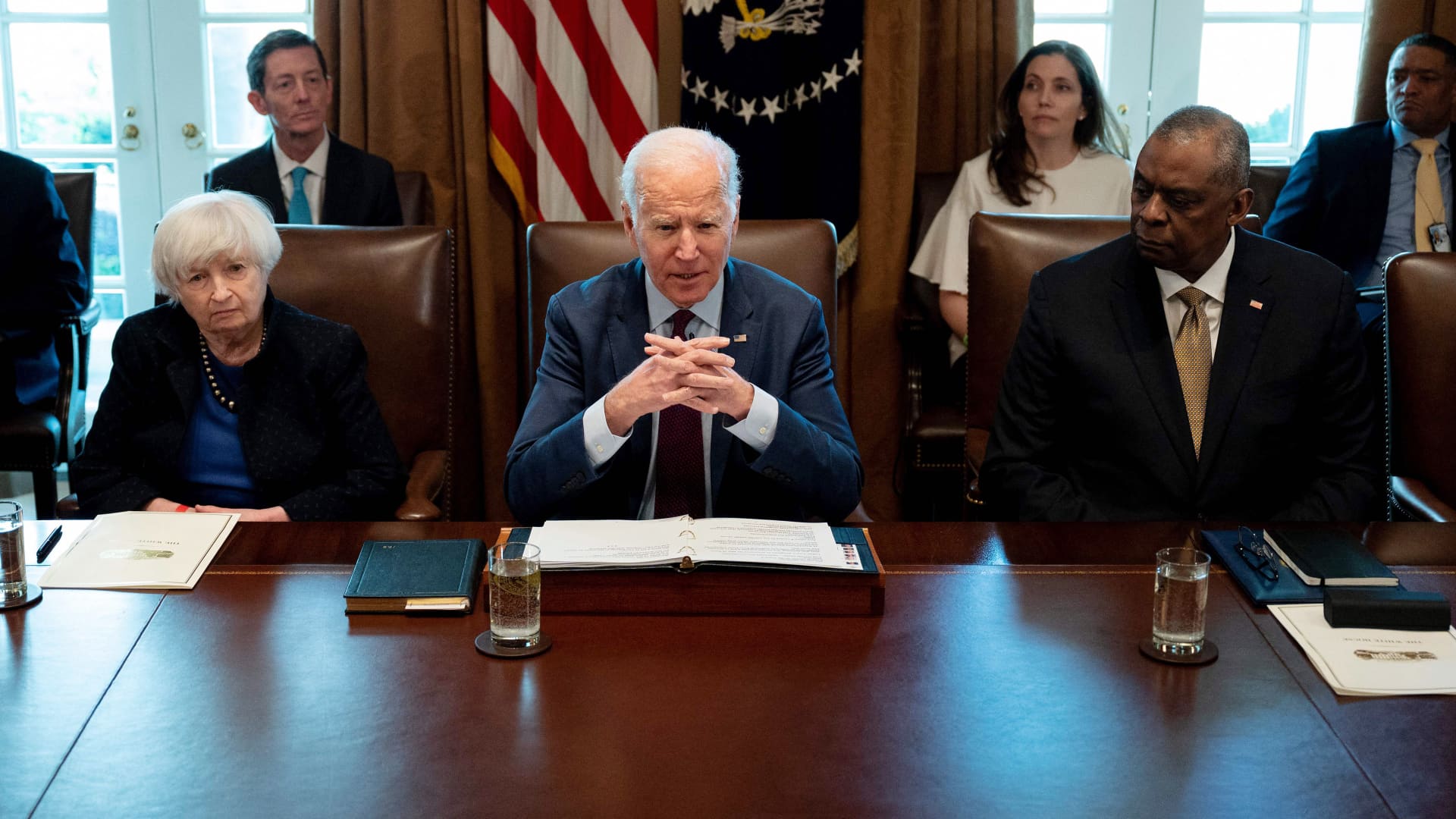US President Joe Biden, with Treasury Secretary Janet Yellen (L) and Defense Secretary Lloyd Austin (R), speaks during a meeting with his cabinet at the White House in Washington, DC, on March 3, 2022.
Jim Watson | AFP | Getty Images
U.S. President Joe Biden on Friday signed an executive order paving the way for Washington to impose sanctions on financial institutions that help Russia evade sanctions, the White House said in a statement.
The executive order, part of a wider U.S. crackdown on sanctions evasion, also gives Washington the ability to broaden import bans of certain Russian goods, such as seafood and diamonds, the White House said.
“We are sending an unmistakable message: Anyone supporting Russia’s unlawful war effort is at risk of losing access to the U.S. financial system,” National Security Advisor Jake Sullivan said in a statement.
Senior administration officials, speaking on condition of anonymity, said the new executive order will make clear to financial institutions that they must either stop allowing their companies to ship components and goods to the Russian defense sector, or face significant sanctions.
The United States and its allies, including the European Union and Britain, imposed sanctions on Russia after the February 2022 invasion of Ukraine. They have continued to ratchet up pressure on Moscow, targeting Russian President Vladimir Putin, the financial sector and dozens of oligarchs.
The order is being issued in coordination with allies, the officials told reporters.
The United States has repeatedly warned companies against evading U.S. sanctions imposed on Russia, and has targeted firms in the United Arab Emirates, Turkey and China that it has accused of helping Moscow skirt the measures.
Earlier this month, the United States imposed sanctions on hundreds of people and entities including in China, Turkey and the United Arab Emirates, as it targeted Russia’s sanctions evasion.
Senior U.S. officials have also traveled to Turkey, the United Arab Emirates and other countries to warn that businesses could lose access to G7 markets if they do business with entities subject to U.S. curbs.
While the order is not aimed at specific countries, those that have been most implicated in evasion and violations of U.S. sanctions are “obvious,” Edward Fishman, who worked on Russia sanctions at the State Department during President Barack Obama’s administration, said, citing, among them, China, Turkey and the UAE.
“This is really about signaling a much more aggressive U.S. enforcement posture, putting banks and companies around the world on notice,” said Fishman, who is now at Columbia University.
It sends a message that the U.S. will behave differently in the months ahead and likely sanction more companies and banks that are doing business with Russia’s military industrial complex, Fishman said, adding that he expects many banks will decide to shun Russia as a result.
Choke point
The new order gives Washington and its allies new tools to target the networks Moscow was trying to put in place to circumvent these sanctions through the use of front companies and “witting and unwitting financial intermediaries,” one of the senior officials said.
“We’ve sanctioned a number of these companies that we’ve found, but ultimately the choke point for these companies and Russia’s ability to continue to try and circumvent our sanctions is the financial system,” the official said.
“What this tool allows us to do is to target those institutions and give them a very stark choice.”
The provisions take effect immediately.
The officials said they were not aware of any U.S. or European institutions that were in violation of the order, noting that most U.S. and European firms had already scaled back their business with Russia dramatically.
Brian O’Toole, a former Treasury Department official now with the Atlantic Council think tank, said the executive order will allow the Biden administration to use secondary sanctions in a more nuanced way.
“This … should make it easier to message and impose sanctions on Russian sanctions evasion efforts and provide a deterrent effect for those contemplating doing business that may relate to Russia’s military,” O’Toole said.
“These are akin to Iran-style sanctions,” he said.
The executive order will also give Washington the ability to ban products that originated in Russia but were transformed outside of the country, including diamonds and seafood, the White House said.
The action comes after the Group of Seven countries earlier this month announced a direct ban on Russian diamonds starting Jan. 1, followed by phased-in restrictions on indirect imports of Russian gems from around March 1.






